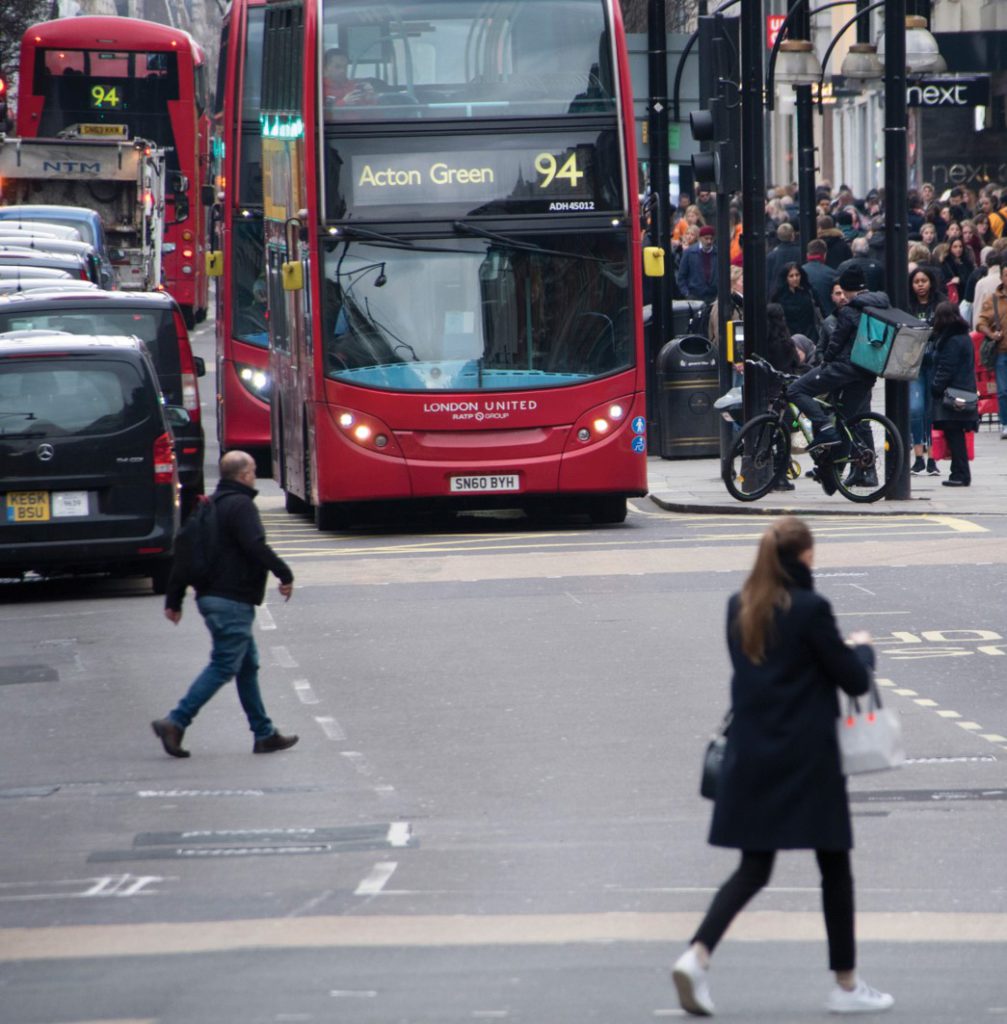OUT(bound) and proud with TfL's Colleague Network Group
Transport for London’s Colleague Network Group, OUTbound, supports Lesbian, Gay, Bi, Trans, Queer/Questioning, plus (LGBTQIA+) identifying colleagues across the organisation. We spoke to them about how and why the mobility sector must place LGBTQIA+ workplace inclusion higher on the agenda, and their advice for others in the transport sector.
This Pride Month, cities, operators and others across the transport sector have called for safer, more accessible, and more equitable mobility. Yet, despite recent progress, LGBTQIA+ communities and individuals (also referred to in this article as queer) still face discrimination in everyday urban public spaces, including public transport.
 Inclusive mobility starts at home. Without diverse and inclusive workplaces, we cannot provide inclusive mobility for others. The queer community is severely underrepresented in the workplace, especially at more senior levels, and with research revealing individuals' pervasive experiences of marginalisation and microaggressions. Tackling this is exactly what POLIS member Transport for London’s (TfL) Colleague Network Group OUTbound seeks to do.
Inclusive mobility starts at home. Without diverse and inclusive workplaces, we cannot provide inclusive mobility for others. The queer community is severely underrepresented in the workplace, especially at more senior levels, and with research revealing individuals' pervasive experiences of marginalisation and microaggressions. Tackling this is exactly what POLIS member Transport for London’s (TfL) Colleague Network Group OUTbound seeks to do.
We spoke with Joe Brown, Strategic Delivery and Change Manager and OUTbound's Chair, about the group, the importance of Pride Month for those working in the transport sector, and the ‘pink glass ceiling’- a term you may not have even heard of. The group holds important learnings for others seeking to make their workplaces more inclusive, those who are well-versed in the issues and debates surrounding LGBTQIA+ inclusion, those who want to establish similar initiatives, or those who simply want to listen and learn.
POLIS: Can you tell us a bit about yourself, and your role at TfL?
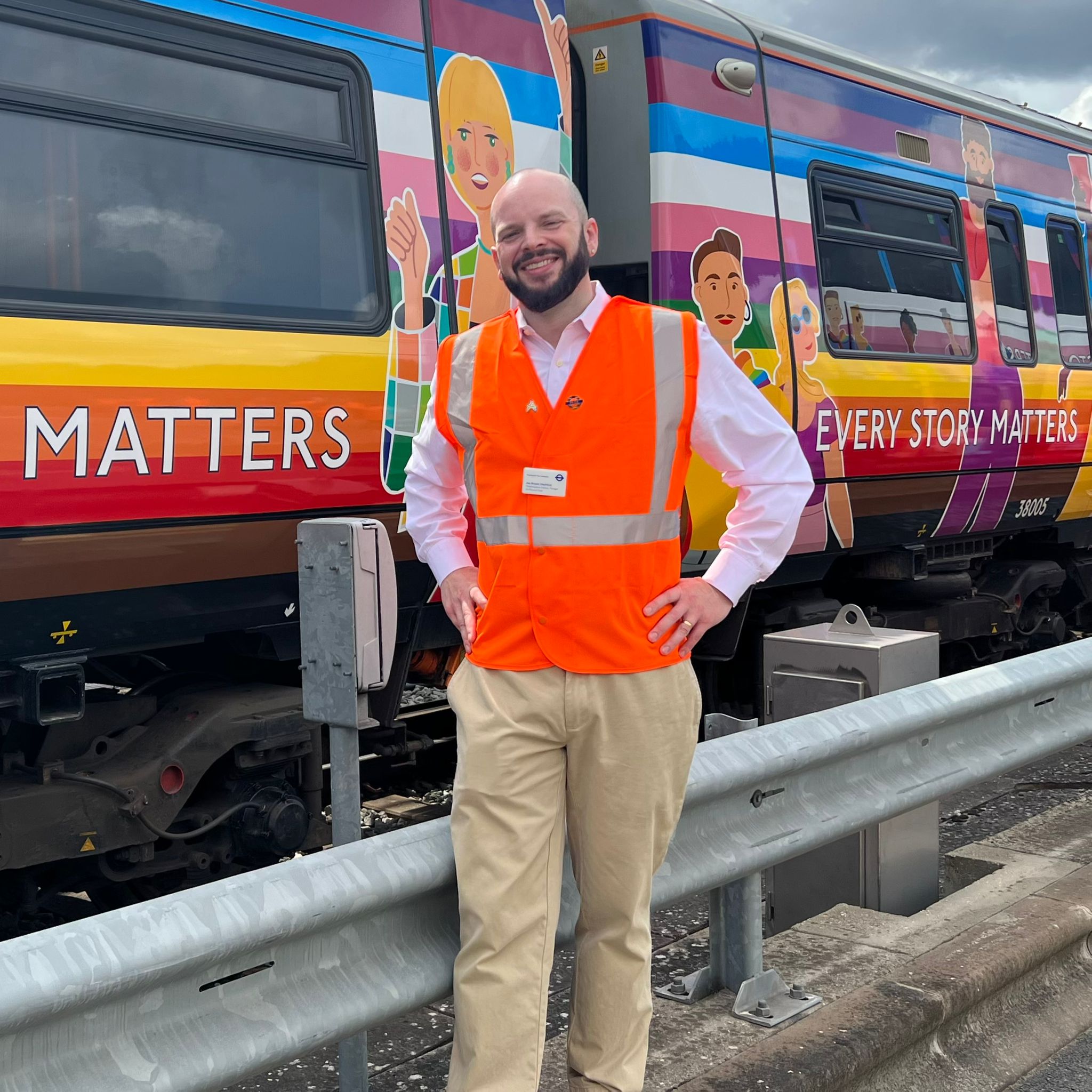 Joe: Hello! My name is Joe Brown, I use he/him pronouns, and I identify as a cisgender gay man. My current role is Strategic Delivery and Change Manager within the Customer Operations Directorate of TfL. I am primarily focused on the continuous improvement of existing processes and the creation and embedding of new ones, such as utilising technology to work smarter. I have worked at TfL for 26 years now, having started more or less from school as a Guard on the Northern Line in 1997!
Joe: Hello! My name is Joe Brown, I use he/him pronouns, and I identify as a cisgender gay man. My current role is Strategic Delivery and Change Manager within the Customer Operations Directorate of TfL. I am primarily focused on the continuous improvement of existing processes and the creation and embedding of new ones, such as utilising technology to work smarter. I have worked at TfL for 26 years now, having started more or less from school as a Guard on the Northern Line in 1997!
In my personal life, I live in Peckham, southeast London with my husband who I’ve been with for 22 years and married for 17, and a very spoiled Staffordshire Bull Terrier. I have a bit of a side hustle as an author, with my tenth title coming out in July – I combine my love of railways and love of cartography through drawing atlases of railway history… working on these and running three times per week keeps my mind and body healthy.
POLIS: For those who may not know what they are, what is a colleague network group? What role do they play at TfL?
Joe: Colleague Network Groups (CNGs) are very much ‘for the people, by the people’ – they are groups of colleagues with something in common aimed at providing a supportive community, an opportunity to learn from each other, and externally, to lobby for positive change and help elevate understanding and awareness throughout the organisation.
At TfL we have six: OUTbound represents the Lesbian, Gay, Bi, Trans, Queer/Questioning, plus (LGBTQ+) communities, there is also a Women’s CNG, a Disability CNG, a CNG for Carers, Parents and Guardians, ‘Raising Awareness of Culture and Ethnicity’ (RACE), and a Faith CNG.
A tenet of the CNGs is that while they are formalised and very much part of TfL’s Diversity & Inclusion strategy, and we receive great support from senior leadership sponsors, they are formed of colleagues from across all levels of the organisation and do not hold a management function. This empowers us to lead our communities with authenticity and credibility, particularly in times of organisational change where marginalised colleagues need our support the most.
POLIS: When was OUTbound established? What was the process behind this?
Joe: OUTbound has existed in some form for 18 years, with the first meeting of the ‘LGBT Staff Network Group’ occurring in 2005 following the organisation's need to establish staff network groups to further inclusion in the workplace. I believe that simple terms of reference were drafted, and the leaders were recruited; every two years since there has been new leadership. There is a formal expression of interest and an interview process to select the new leaders.
POLIS: Why was there a need for such a group?
Joe: The transport industry generally had always been the preserve of cis straight white men, and still is to varying degrees, especially the higher you go up the organisational structure - TfL is no different in this regard. Certainly, reflecting on when I first joined the workforce, the ‘messroom culture’ in most places was extremely hostile to LGBTQ+ people, and to women. The fact that I felt compelled to transfer as a driver to what was known as ‘The Pink Depot’ for my psychological safety is indicative of this, as there were only a few workplaces where LGBTQ+ people could be their authentic selves 25 years ago.
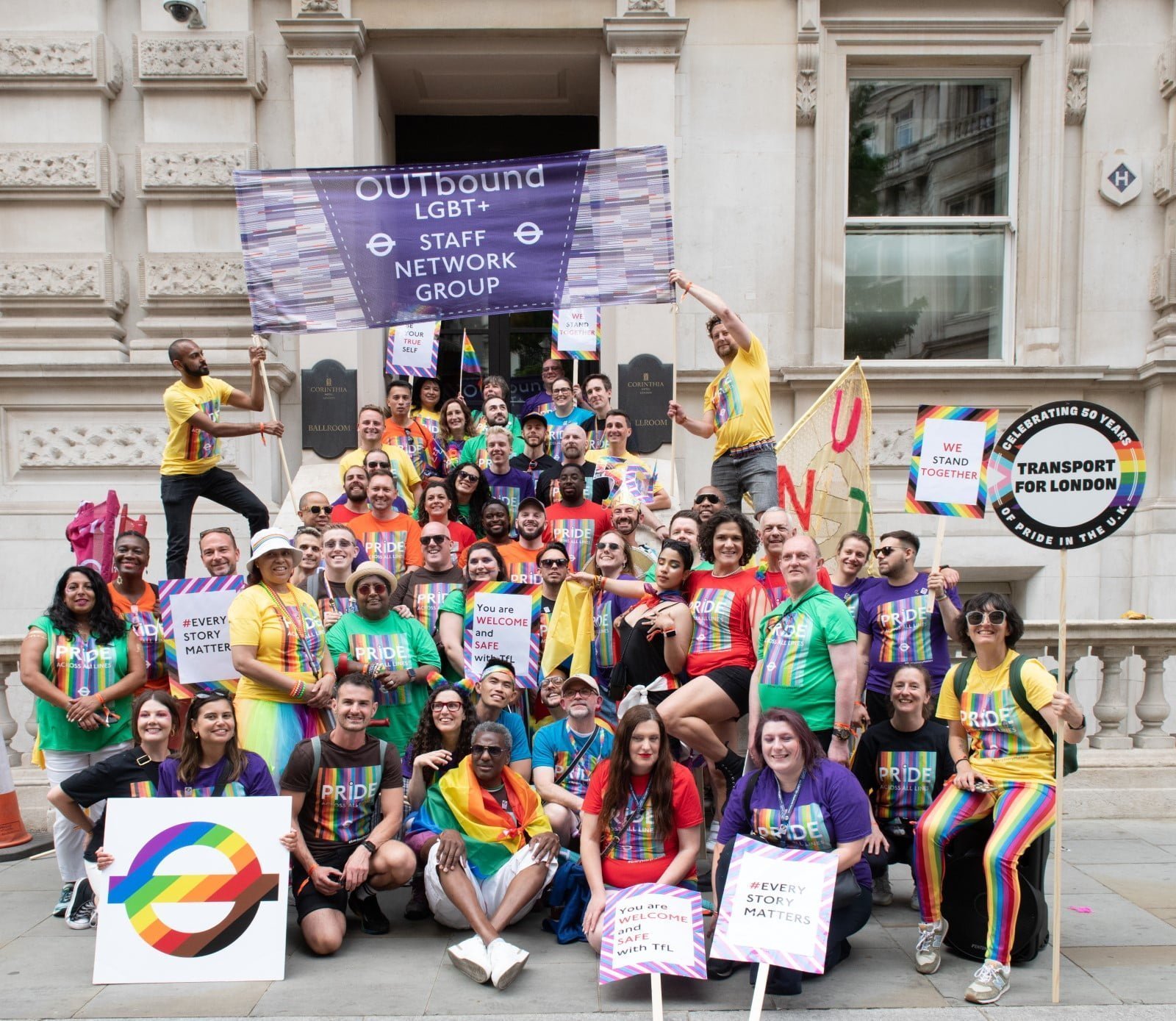
Credit: OUTbound, Transport for London
POLIS: What do you see as the key challenges facing LGBTQIA+ individuals working in the transport sector?
Joe: I still feel we are largely invisible – there are 30,000 people at TfL and I see no visibility of LGBTQ+ people amongst senior leadership. When you see ‘nobody like you’ leading the organisation, it is a deterrent to becoming a leader. As one of our members put it in one of our regular temperature-check surveys: “There is a pink glass ceiling”. This is not because there are not any LGBTQ+ senior leaders, but perhaps it is indicative of a deeper issue which goes beyond LGBTQ+ identities where people who are not cis straight white men feel the need to modify how they present, to become inauthentic to get on in their careers.
In addition, there seems to remain a lot of ignorance, in particular around trans and nonbinary identities. This means that our trans and nonbinary people do not always get the support they should expect simply because line managers do not know what to say or how to help, so they do nothing or not enough.
Another challenge is reaching frontline operational colleagues – so much of what we do is dependent on electronic communication, but large cadres of TfL’s people are very rarely online, as they are driving trains, working on the track, and so forth. Many do not even know that we exist, despite our best efforts to raise our profile.
POLIS: How has the group sought to address or challenge these issues?
Joe: This is where OUTbound is so powerful, as we advise and support not only our people but also their line managers, and we relentlessly outreach to the organisation to educate through lunch & learn sessions and presentations to teams around the business, as well as a series of roadshows last year to reach those hard-to-reach frontline operational people.
A drawback is that you are often 'preaching to the choir' – the people who give up their lunchtime to learn about LGBTQ+ identities are often allies in the first place and therefore not the people we need to reach. We have worked hard to collate everything through a SharePoint resource so that people can learn independently and access guidance and support going forward. I hope this is our biggest legacy as leaders.
POLIS: You noted that TfL has several Colleague Network Groups - how does OUTbound cooperate with them?
Joe: The current leaders of the six groups were all appointed together in October 2021, and we quickly forged an incredibly mutually supportive relationship. We have joined each others’ groups, attend each others’ events, and run many joint events reflecting intersectionality.
Plus, many people wear multiple ‘hats’: our identities do not just stop at the boundaries of one CNG and we champion this. So often it is the same forces trying to erode all our rights and demean us with the ‘anti-woke’ movement, against which unified we are stronger than the sum of our parts.
Every Story Matters artwork across London Underground stations. Credit: Transport for London
POLIS: Several transport operators- in the UK and indeed across the globe- have established similar groups. Do you feel they are changing the workplace cultures you see across the sector? What more can they do?
Joe: Interesting that you should ask, as I just founded a network of LGBTQ+ networks in the UK transport industry this year called ‘Journey’. One of our aims is to collaborate, identify best practices, and then lobby our respective organisations to bring everywhere up to the same level. We are working not just on the experience of LGBTQ+ employees, but also our customers, and recently held our first working group aimed at improving the psychological safety of LGBTQ+ customers on the UK’s transport system.
It is no coincidence that my experiences of homophobia in the workplace would be far less likely repeated today – it is a testament to the endeavours of my predecessors in the OUTbound leadership who worked so tirelessly to hold the mirror up to our organisation and lobby for greater inclusion, visibility and representation. This applies to all the CNGs, both at TfL and at any other organisation across the globe.
POLIS: For other organisations seeking to follow suit and set up such Colleague Network Groups, what advice would you give them? What are the main pitfalls to avoid or actions to include?
Joe: Most fundamentally, be led by your people – listen to what they are telling you and want. Be data-led, explore well-being surveys and identify where the pain points are to focus your attention. You cannot fix the world overnight and there are so many things you could go after, so prioritise and keep the list short at first.
As the main pitfalls to avoid, remember some marginalised groups might already be disengaged and mistrustful, so effort may be needed to reach out and create safety for them to speak up about how they feel. Listening sessions are very powerful, but you have got to deliver tangible action afterwards or you deepen the mistrust and disengagement even further.
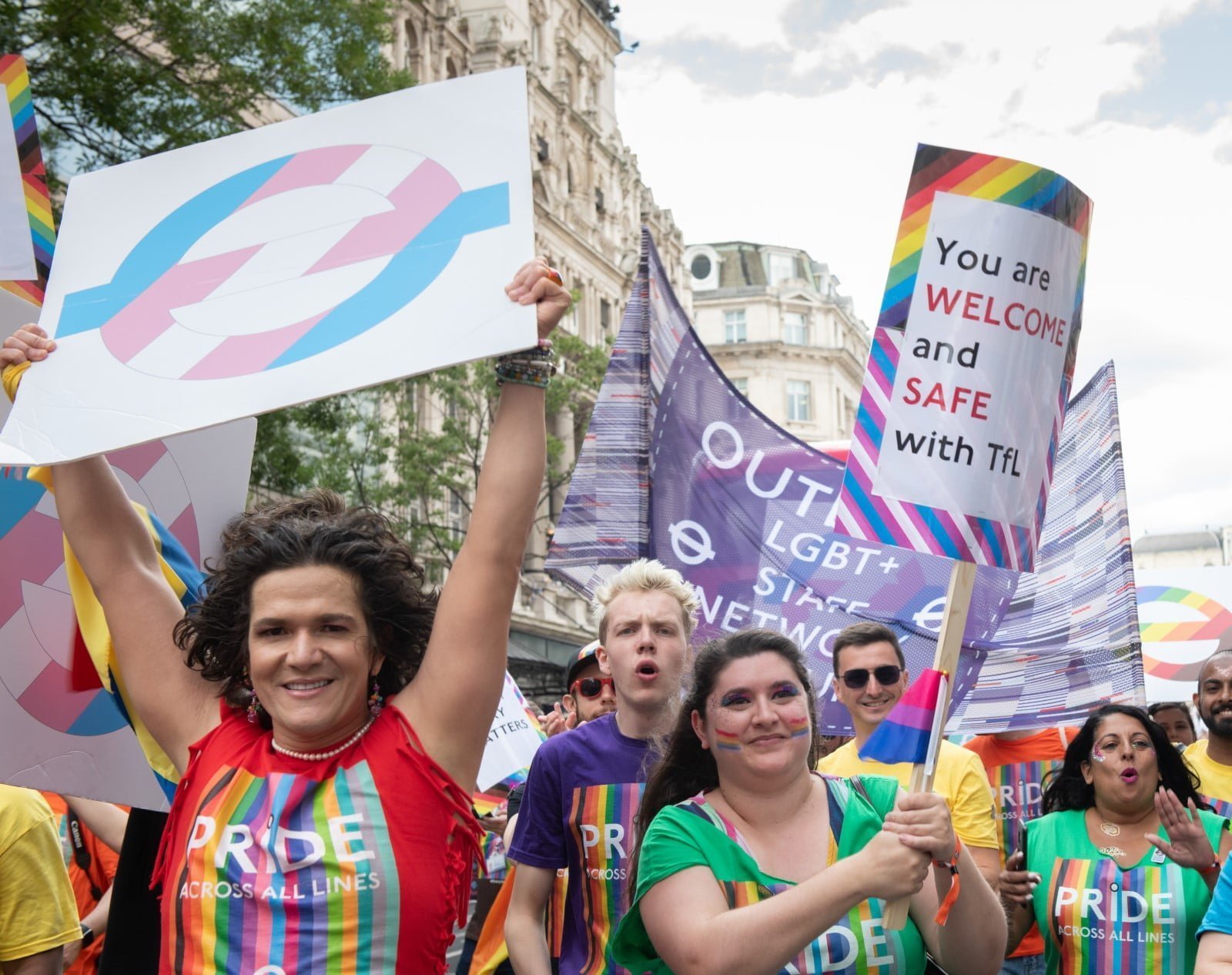
Credit: OUTbound, Transport for London
POLIS: Why is Pride Month important to OUTbound?
Joe: There is a theme in my answers about LGBTQ+ people being visible and being heard, and that to me is what Pride Month is all about to be noisy, colourful, authentic, and proud.
It is not just a celebration, it is a commemoration: we give thanks to our ancestors who sacrificed so much so that we could enjoy the freedoms we have today; we remember the countless LGBTQ+ people who we have lost to violence both state-sponsored and otherwise, to suicide and HIV/AIDS… and those who continue to be persecuted around the world today.
The tide feels like it’s turning the wrong way with rights being rolled back in some US States and countries like Uganda, and there is currently a toxic transphobic narrative, so Pride is about all LGBTQ+ people standing shoulder to shoulder as a united community, not just in the UK but across the globe.
POLIS: Will you be doing anything specific to celebrate?
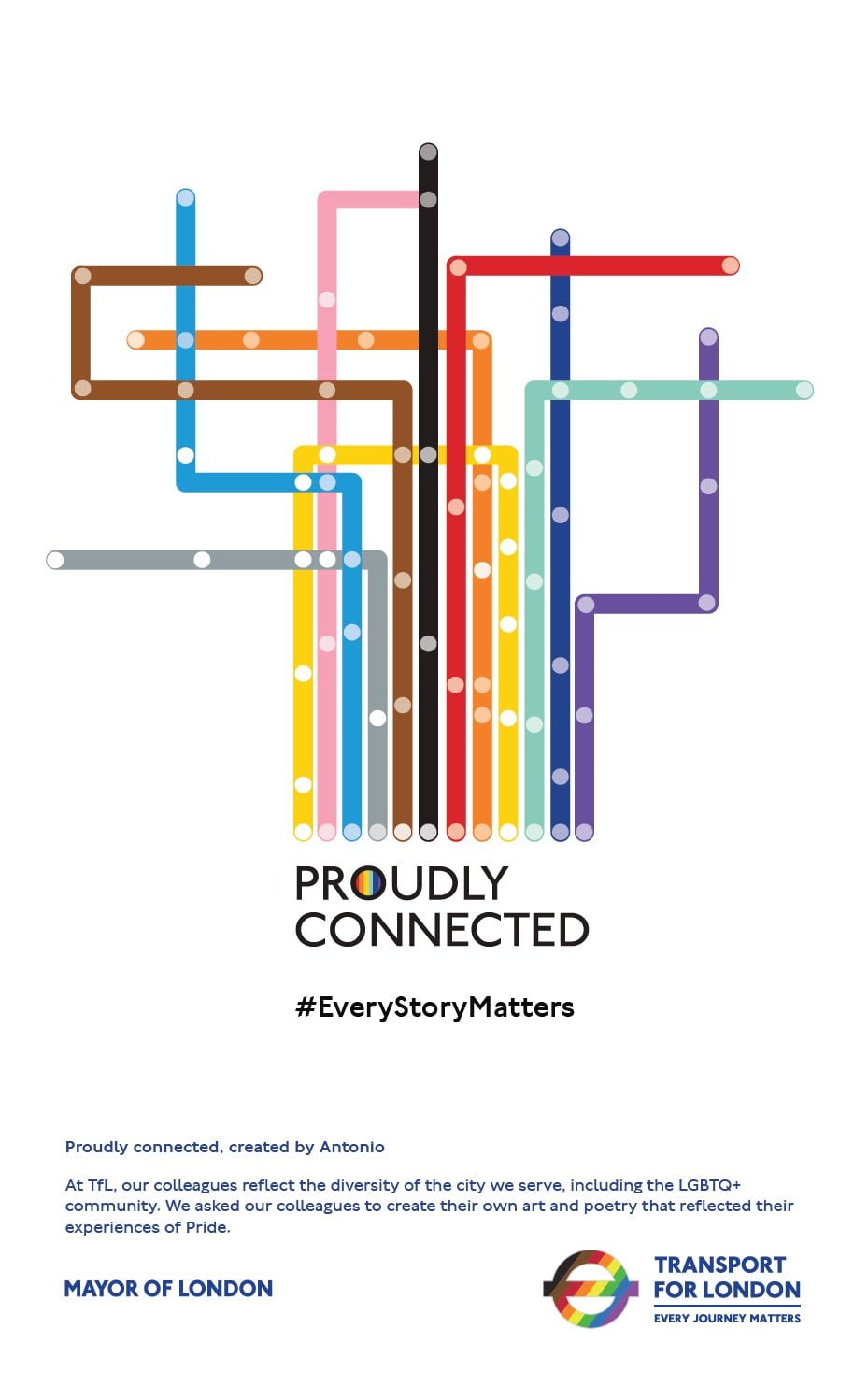
Credit: OUTbound, Transport for London
Joe: OUTbound and TfL have a huge offering which we are so excited about a vinyl-wrapped bus and trains, a design putting our people at the heart of the imagery in a unique and ground-breaking way under the #everystorymatters strapline. We have run a creative competition among our members which drew an overwhelmingly high quality of entries, which will be displayed around the network.
We have portraits with LGBTQ+ celebrities taken at TfL locations, group portraits of OUTbound members, and quotes from LGBTQ+ authors, all again being displayed around the network. Finally, as a network, we are coming together for socials in the run-up to Pride in London on 1 July. Of course, 1 July is just the start, OUTbound will also be present at Trans Pride on 8 July, Croydon PrideFest on 15 July, UK Black Pride on 20 August, and Bi Pride on 2 September.
Want to find out more about Colleague Network Groups?
Check out here “Gender imbalance in the transport sector: A toolkit for change”, a new report written by POLIS with funding from the FIA Foundation and support from Heather Allen. The toolkit provides in depth information on network groups, how to set them up and ensure success.

